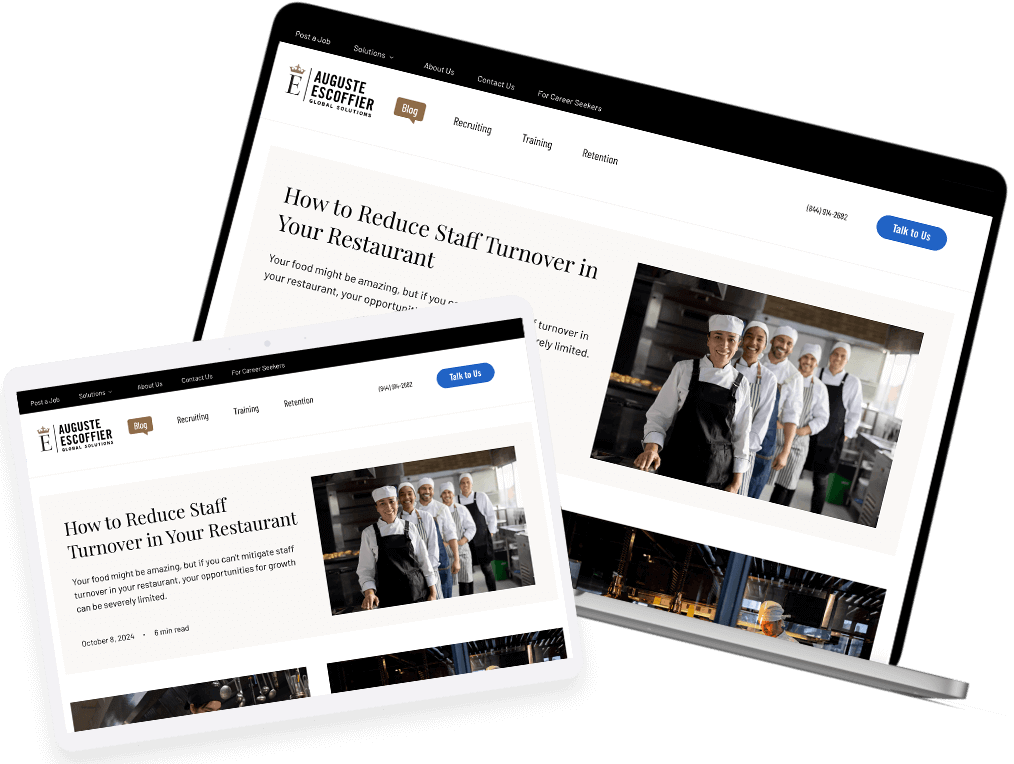
What Is Upskilling and How Can It Grow Your Foodservice Business?
Employers who encourage their staff to grow in their skills tend to have lower turnover and more productive employees. Find out how upskilling can work for you.
Imagine losing a top-performing chef simply because they didn’t see a path forward in your restaurant. What if you could have retained them by offering just a little more training and support?
There’s no denying that things are moving fast in the world, prompting employers and employees alike to revisit their roles and their skill sets more frequently than in the past. And as more people re-evaluate their expertise to identify areas where they can add new competencies, the idea of “upskilling” becomes more prominent than ever.
And this applies to the foodservice and hospitality industries as well.
True, good old-fashioned people skills will never go out of style – and that award-winning bolognese recipe should probably remain untouched. But there are plenty of other opportunities for your staff to grow in their roles, and many of them are eager to do so.
Read on to find out more about the concept of upskilling and how you can use it to grow your business.
What Is Upskilling?
Upskilling is when employees acquire new skills or enhance their existing ones; this knowledge or expertise is directly related to the job and is different from “reskilling,” which relates to learning entirely new skills, either to change jobs or take on a new role.
In recent years, a lot of the conversation around upskilling has had to do with employees acquiring digital or tech skills, which today may also include proficiencies with AI.
In the foodservice and hospitality industries, upskilling may involve developing digital and tech skills for managing reservations, orders and delivery, cost control, human resources, and event coordination. But upskilling also encompasses more traditional skill development, such as refining culinary techniques to advance in the kitchen hierarchy or strengthening power skills—also called “soft skills”—which build interpersonal, leadership, and management abilities essential for career growth.
Why Upskilling Is Good for Business
When employees have opportunities to grow their skills, they’re more likely to stick around—they can see opportunities for advancement and pursue areas of interest that can keep things interesting on the job.
Upskilling can also help set you apart as an employer. A Gallup and Workman study revealed that less than half of employees strongly feel that they have the skills needed to be exceptional at their current job, and that same study reported that “employees who strongly agree that their organization encourages them to learn new skills are 47% less likely to be searching or watching for another job.”
An employer can save money by reducing their employee turnover. The National Restaurant Association estimates that restaurants spend nearly $6,000 on average to replace a single hourly employee a year in staff turnover. When you consider that the average restaurant’s profit margin hovers precariously around five percent, it’s easy to see how a reduction in turnover can make a big difference in your bottom line.
Ways to Help Your Employees Upskill
Upskilling is just another kind of training, and good training starts with clarity about roles and expectations. That clarity is conveyed via clear job descriptions during recruiting and hiring, then with solid onboarding materials and quality mentorship to build a strong foundation.
In a restaurant, upskilling often goes hand-in-hand with career planning. As kitchen staff develop new skills and cooking techniques, it sets them up for advancement. A line cook may have the opportunity to advance to station chef, with an eye toward developing the skills to become a sous chef. Their specific upskilling might come in the form of gaining expertise in recipe development, ordering, and management. For the front of house, upskilling might look like teaching servers the skills they’ll need to move into a managerial role and take on additional responsibilities.
When an employee understands the steps involved, they know they’ll have the opportunity to continue learning and building more advanced skills. As an employer, you can help employees like that entry-level chef—and others—identify gaps in their skills and knowledge, encourage them to grow, and build a culture in which they’re encouraged to ask questions and pursue expanded roles.

How Escoffier Global Can Become Your Upskilling Partner
For those scenarios and others, you can help your employees upskill through education, training, and customized programs.
Your employees can continue developing their skills via a program like ESource, which offers everything from technique videos to courses. These are valuable for on-demand training of practical skills your employees need but that you might not have time to teach.
If you’re busy managing the hectic demands of a bustling catering company, for example, ESource could be a convenient way to provide your employees with training materials they can consume during their downtime—which might not otherwise coincide with your downtime.
If you already have digital training content as part of your benefits offering, Escoffier Global can license our content to seamlessly integrate with your existing Learning Management System, so there’s continuity and no need for employees to jump into different systems.
Upskilling Can Also Mean Offering Education to Your Employees
For employees who want to do even more, you might consider Work & Learn, a flexible program that offers a scholarship for employees’ culinary education through online classes offered at Auguste Escoffier School of Culinary Arts—an Escoffier Global partner.
With Work & Learn, employees are eligible for a $1,000 scholarship upon sign up; increased scholarship amounts are determined by an employer’s tuition assistance program with matching available up to $5,250.
With a program like Work & Learn, your promising restaurant employees can continue showing up for their shifts while also getting an excellent education; no need for them to take a leave of absence to pursue their education.
Picture This: A Tale of Two Employees
Imagine two restaurant employees,Taylor and Cameron, who are new to the job at two different establishments. They’re hired to work in the kitchen and they’re each eager to learn, asking lots of questions, observing how the more experienced staff members work, and studying the role.
Taylor works for an employer who is perfectly adept at hiring, but then doesn’t provide extra training or help their employees picture how they can improve and advance. The employer expects their workers to be happy to have a job, and they assume that it’s normal to experience a revolving door of incoming and outgoing staff members.
Taylor would like to move up into a sous chef role but finds themselves stuck in prep work for longer than they’d anticipated. With no offers of training and no time (or so they believe) to attend school, they start looking around for another job or they resign in order to further their education.
| Taylor: No Upskilling | Cameron: Encouraged to Upskill |
| Gets hired and trained, then left on their own | Gets hired and trained, then encouraged to keep learning |
| Stuck in the same role, no vision for advancement | Given a clear picture of advancement opportunities with continued training |
| Starts looking for a new job, distracted from current role | Focused on how they can further their career, excited to help the company |
| Employer loses a trained worker and has to start over | Employer gains a long-term, committed employee and reduces turnover costs |
Cameron works for an employer who understands the importance of ongoing training and the benefits it provides employee and employer alike. Cameron, too, would like to become a sous chef, and their employer, always with an eye toward upskilling, has understood this employee’s goals from the day they were hired.
The employer encourages Cameron to learn new skills and to pursue new roles. Cameron is mentored by experienced staff members and is encouraged to pursue training. They enthusiastically gobble up the ESource training videos and attend culinary school online.
What happens with Cameron? They become a long-term hire and a great addition to the team, helping the business’s bottom line and lifting up others around them. And the employer has a happy and loyal cadre of people who help stabilize the workforce and contribute to a smooth operation.
The difference between the two scenarios? Upskilling.
Let Upskilling Take Your Business To New Heights
Today’s business owners know that employers who show their employees how they can improve and advance have a better chance at creating a thriving work environment and a profitable business.
Through Escoffier Global, employers can access a suite of culinary and hospitality development solutions. With tools that can help make hiring and training easier and more effective, Escoffier Global aims to link great employers with hard-working employees to support the overall health of the hospitality industry.
Questions? Contact the Auguste Escoffier Global Solutions team to learn more about Work & Learn and customized training programs for your employees.
Enjoyed this article? Read these next:


